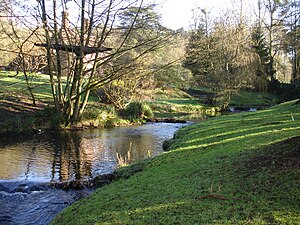River Tillingbourne
|
Tillingbourne |
|
|
River Tillingbourne running through the Albury estate
|
|
| Country | England |
|---|---|
| County | Surrey |
| Districts | Mole Valley District, Guildford Borough |
| Tributaries | |
| - left | Law Brook |
| - right | Sherbourne Brook |
| Source | Tilling Springs |
| - location | Leith Hill, Surrey |
| Length | 19 km (12 mi) |
| Discharge | for Shalford |
| - average | 0.54 m3/s (19 cu ft/s) |
| - max | 6.1 m3/s (215 cu ft/s) (15 September 1968) |
| - min | 0.23 m3/s (8 cu ft/s) (4 August 1992) |
The River Tillingbourne (also known as the Tilling Bourne) runs along the south side of the North Downs and joins the River Wey at Guildford. Its source is near Tilling Springs to the north of Leith Hill at grid reference TQ143437 and it runs through Friday Street, Abinger Hammer, Gomshall, Shere, Albury, Chilworth and Shalford. The source is a semi-natural uninhabited area. The catchment is situated on sandstone which has a low rate of weathering. The Tillingbourne is 18 km (11 mi) in length.
The Tillingbourne initially flows northward for 4 km (2.5 mi) down the northern slopes of Leith Hill over a series of weirs and cascades, before turning west to run for 14 km (8.7 mi) through Abinger Hammer and Chilworth towards the River Wey at Shalford. The river is classified as a subsequent stream, since its course is determined by the direction of the stratum of softer rock for the majority of its length.
The river has four principal tributaries: the Friday Street stream joins at Wootton House; the Holmbury St Mary stream joins at Abinger Hammer; the Sherbourne Brook drains the Silent Pool and Sherbourne Pond and the Law Brook joins near Postford.
The river used to power a number of gunpowder, paper and flour mills in the area. The gunpowder mill was at Chilworth. Present day users include a trout farm, watercress beds,a business growing reeds and is often studied by students from nearby field studies centres, such as Sayers Croft and Juniper Hall.
...
Wikipedia

